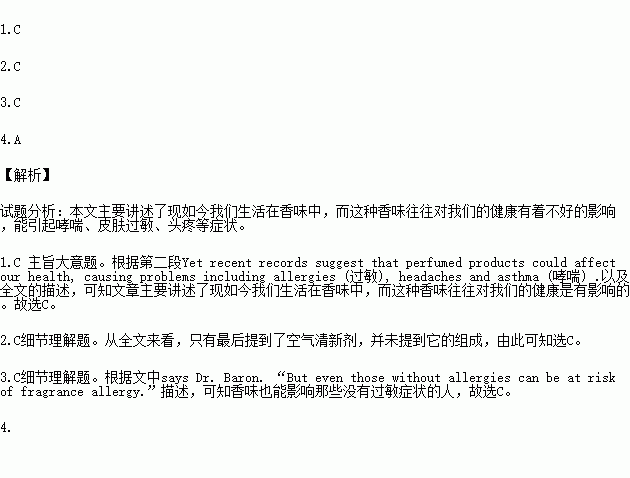题目内容
The smell of fresh air is becoming something of a distant memory, thanks to our increasing use of fragrance (香气). From air fresheners to scented (有香味的) candles, we live in a world of scent.
Recent figures show seven in ten people use air fresheners or scented candles to keep our homes smelling sweet. Yet recent records suggest that perfumed products could affect our health, causing problems including allergies (过敏), headaches and asthma (哮喘) .
One leading expert believes nearly a third of people suffer health effects from being exposed to scents. A major problem is so-called “contact” allergy—where perfumes and scented products cause eczema (湿疹) when they come into contact with the skin. About one in 20 is thought to be affected by fragrance allergy.
“Often it may not be immediately obvious that you have developed a fragrance allergy,” says Dr. Baron. “You don’t react immediately. Gradually, as you are exposed more and more, the body increases its reaction, until it becomes noticeable to you.”
People with pre-existing eczema are particularly vulnerable (易受影响). “The eczema worsens in areas in contact with perfumes,” says Dr. Baron. “But even those without allergies can be at risk of fragrance allergy.” You can become suddenly allergic to perfumes and personal care products that you have been using for years. “Even if you know which fragrance causes a problem, it can be difficult to avoid, as most personal care products –soap, shampoo, sun cream and washing powder—contain fragrances,” says Dr. Baron.
And strong scents can also cause headaches. Fragrances activate the nose’s nerve cells, stimulating the nerve system associated with head pain. To minimize risk, sufferers are advised to minimize the contact.
“Fragrance suggests cleanliness – yet people are smelling a potentially dangerous chemical mixture,” says Anne Steinemann, professor of the University of Washington. “We often use them to mask one problem – as with air fresheners – but create a greater one – adding poisonous chemicals to the air.”
1.What is the text mainly about?
A. The world trend of using fragrance.
B. The benefits of using non-fragranced products.
C. The health problems caused by fragrance.
D. The ways of removing allergy.
2.Which of the following questions does the text NOT answer?
A. Which products contain fragrance?
B. What’s the influence of fragrance in the air?
C. What are the air fresheners made up of?
D. How are headaches caused by fragrance?
3.According to Dr. Baron, .
A. our bodies have an immediate reaction to fragrance.
B. seven in ten have suffered fragrance allergy.
C. fragrance can affect people who don’t have allergy.
D. people can avoid contacting with fragrance easily.
4.The following paragraph might discuss .
A. the asthma caused by strong scents.
B. people’s efforts to protect fresh air.
C. the methods of curing eczema.
D. the bad effects of air fresheners.

